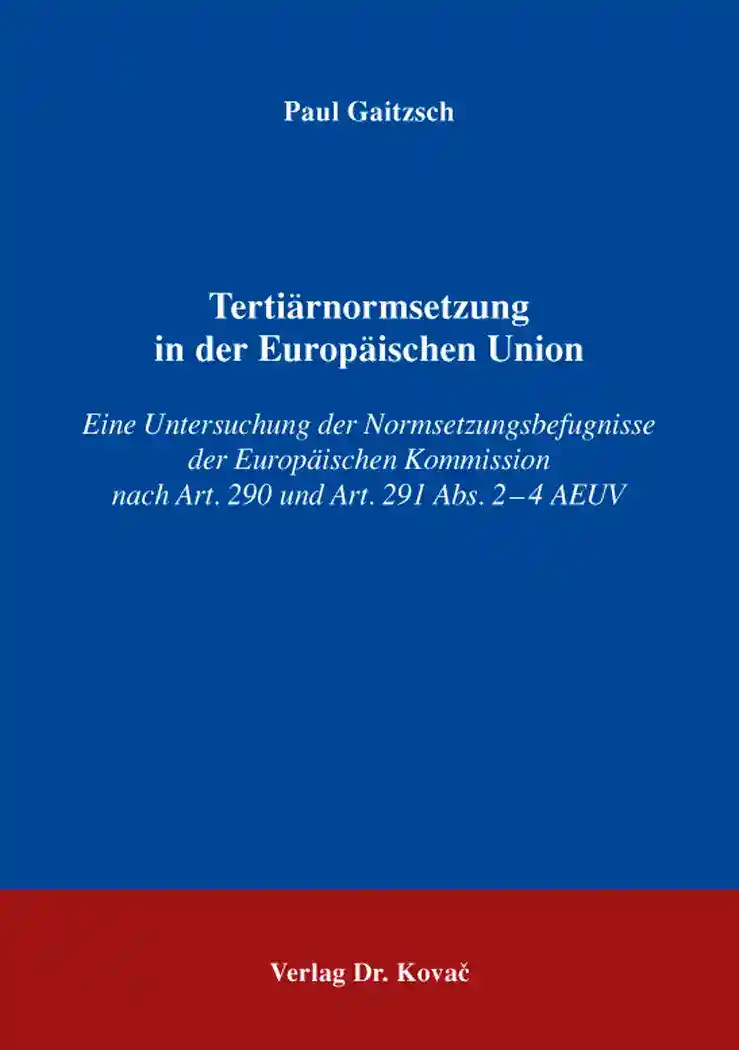Paul GaitzschTertiärnormsetzung in der Europäischen Union
Eine Untersuchung der Normsetzungsbefugnisse der Europäischen Kommission nach Art. 290 und Art. 291 Abs. 2–4 AEUV
Studien zum Völker- und Europarecht, volume 128
Hamburg 2015, 394 pages
ISBN 978-3-8300-8217-0 (print) |ISBN 978-3-339-08217-6 (eBook)
About this book deutschenglish
The possibility of the legislature to transfer rule-making powers to adminstrative bodies in a broader sense is a known phenomenon – not only in the Member States of the European Union, but also at Union level itself. Traditionally the legislative concretisation of secondary legislation in order to make this legislation manageable by Commission executive rule-making holds a significant, both in quantitative and qualitative terms, part of the workload of the European Commission. The so-called implementing legislation has always been, mainly under the heading of 'comitology', ie the involvement of committees composed of Member States' representatives in the rule-making process, a fiercely discussed topic in European Union Law. Through the Lisbon Treaty, the possibilities of executive rule-making by the Commission have been completely redesigned: firstly, Art 290 TFEU allows the European Union legislature to delegate powers to amend or supplement legislative acts (delegated legislation). Secondly, according to Art 291(2) TFEU, “where uniform conditions for implementing legally binding Union acts are needed, those acts shall confer implementing powers on the Commission, or, exceptionally, the Council” (implementing legislation). The text examines these rules and the rule-making process following in order to determine whether they are suitable to ensure the design of rules giving appropriate anwers to given problems in a democratic process, applying the rule of law and in a cost-effective manner. These criteria will be – in a separated and thus systematizing manner – firstly be applied to the complex of authorizing the Commission to executive rule-making and secondly on the complex of exercising this authority. The obtained results will also be used to develop categories for a clear delineation of delegated legislation and implementing legislation. The text was accepted by Bucerius Law School Hamburg as a dissertation in the summer of 2014 and was built under the supervision of Prof. Dr. Hermann Pünder, LL.M. (Iowa). The PhD project was funded by the Konrad Adenauer Foundation as part of a graduate fellowship.Keywords
Art. 290 AEUVArt. 291 AEUVDelegierte RechtsetzungDelegierter RechtsaktDurchführungsrechtsaktDurchführungsrechtsetzungEuropäische RechtsakteEuroparechtExekutive NormsetzungRechtswissenschaftTertiärumsetzungIhr Werk im Verlag Dr. Kovač

Möchten Sie Ihre wissenschaftliche Arbeit publizieren? Erfahren Sie mehr über unsere günstigen Konditionen und unseren Service für Autorinnen und Autoren.
